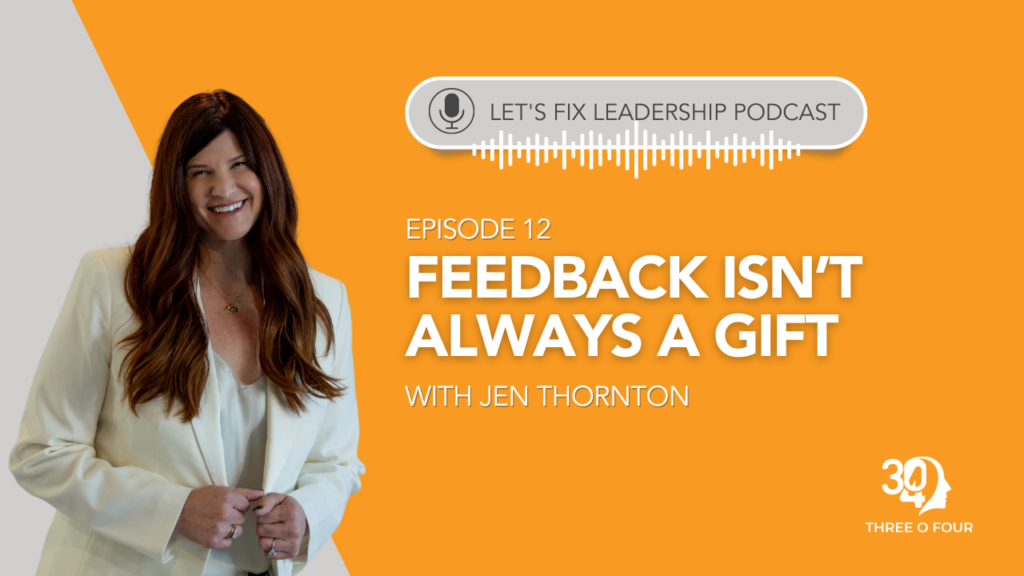0:00:00.6 S1: I have a secret for you. Feedback, it is not always a gift.
0:00:08.0 S2: Welcome back, friends. This is your place or cutting edge tools, exercises, best practices and modern leadership strategies, because on the world is changing, it's time to bring our leadership styles along for the ride, whether you're a company leader, a corporate visionary and entrepreneur, This show gives you new insights into the neuroscience and the language of leadership, plus practical steps and tips to lead your team in a car, Poway Bell also help you keep your people happy and engaged a while achieving your biggest goals. I'm your host, gender, I'm the talent strategist, the brain-based executive coach, speaker, and the founder of the our coaching. Now, let's fix leadership.
0:00:51.4 S1: We have been told a million times, feedback is a gift, but what if it's not a gift we want... What if it's a gift that doesn't fit, or a gift that will try to change who we are and what makes us powerful too often feedback is given without thought of what the gifts should actually be. What makes us powerful is often what gets us in trouble and to often feedback teaches us to dull our super powers because we aren't managing the other side of it. So what does all this mean? How do you know if the feedback is a gift or is it feedback trying to dull what makes you grades? So let's look at some examples of some feedback that is actually trying to tell us to start to manage our Strengths... No, not to be who we are. So example one, say you're a highly creative person and you love looking for new innovative ways of doing things, but you have so many ideas that people think you're talking too much or you only like your own ideas where you go after too many priorities, the feedback might be, you are trying to do too much, you want a good listener or you don't know how to prioritize, and that's not what the feedback should be, the feedback should be...
0:02:09.9 S1: Hey, one of the things that makes you so talented is your ability to see what's possible, I don't wanna lose that, but I would like you to manage where you put your creative energy, so we aren't chasing too many things and doing nothing really well. Now, that is feedback that helps you learn how to situational manage what makes you a power house... Let's look at another example. Say you're a very process-oriented person, and it's your job to be that way. It is what makes you great. But when working with cross-functional partners, you get the feedback that you're too worried about the process and not focusing on the big picture, what the feedback should be to everyone at the table, not just you, is that everyone's super power comes to the table. It sounds different because of the different ways we do work in the different strengths we have at this table, but everyone's voice matters, and not only do we need to know the big picture and the how or the what we're gonna do, we also also have to know the how, and how is that process, or the feedback could be, we love that your process oriented start with the big picture of where you're going and landing, and then give me two or three bullet points on how you're gonna get there.
0:03:27.0 S1: Again, it's not asking you to not be who you are because then you wouldn't be great, that feedback is saying, Here's how I need you to situational manage it in this time period, maybe you have high context and this allows you to be highly strategic because you take the time to understand where something has been and what did and didn't work, and that is powerful, but when working with others and when you communicate, you focus on catching people up before you talk about the future, and you get feedback that you're too focused on the past and not focused on where you wanna take a project or an idea, this is not true about you, not at all, it's just that not everyone has a need for context, and they don't need to know where they've been, they're only focused on where they're going, and this situation, the feedback could be, I appreciate you doing the background work on this problem, I know that you did it well, you always do. Can you provide me with where you want to take the project today and tomorrow, again, it's acknowledging that you wouldn't be great without the super power of context, and it's not asking you to dull it, the feedback is asking you to situational manage what makes you amazing.
0:04:44.5 S2: Let's take a quick break from the conversation, do you have new leaders on your team and you can see their potential, you can see their runway, but you can not figure out how to get them across the finish line, reached out to three or four coaching and learn more about our brain-based competency-focused executive coaching.
0:05:04.7 S1: And as you can see in all of these examples, if you acted on the feedback, you would be changing what makes you a power house and in some situations, possibly feeling bad about your strength and... That is not a gift. I can't tell you how many coaching sessions I spend helping people regain their super power because they've received feedback on the other side of that strength, they've been told their strength is actually bad, and they have over-corrected, they have gone so far and trying to manage that gift of feedback that they've taken away. What makes them great? So what do you do? You can't ignore the feedback, but you can always ask yourself If this feedback is the back side of what makes me great, and if it is, learn how to situational manage what makes you great, and so that you're even a bigger power house than you already are today, now, to be able to ask yourself this question, you need to do a little work, you first need to know what your strengths are. And it's really a great exercise to write down your skills and why they make you great at who you are, and it allows you to own your strengths in a whole new way, and if you're struggling to think about what your strengths are, ask yourself, What do I get feedback on, what did I get in trouble for as a kid? What do I love doing? All of those things are probably your strength, because our strengths are big, they're powerful, people notice them, and knowing what people notice is really important to helping you identify your strengths.
0:06:48.1 S1: Now that you know what your strengths are, I want you to own it. I want you to wear your strengths, I want you to walk tall while wearing them, but know that your best friends can also be your front of me at the same time. Now, to manage the furnace side, take that same list of strengths and then ask yourself, what does it look like when I overuse them, or I'm not situational managed them. This allows you to create a whole new super power, and it's called harnessing your streets, when you can turn your strength up and down like a dial in any given situation. They become even more powerful. Okay, that's a lot. But now I'm gonna take a little turn here, we've been talking about you, but you are a leader too, and I'm sure you give a lot of feedback to others, now you have the opportunity to ask yourself with every piece of feedback, is this the back side of this person's awesomeness, and does this feedback help them learn how to situational manage or am I asking them to... Dull or super power. Am I asking them not to do what makes them great? And if every leader out there knew what their super powers were, knew how to situational manage them and then always gave feedback to someone that was usable, it was situational managing, helping them lean into their greatness, but in a way where it's managed in every single situation.
0:08:19.6 S1: So it's always showing up in a positive way, in all of us out there as leaders could do these two things, well then we'd be fixing leadership...
0:08:31.8 S2: Things for listening to Lexi leadership. By hanging out with me today, you're already on your path, if you're looking to learn more and to see if your company is a good fit for our coaching and leadership education, and Hey, visit 304 coaching dotcom if you got value on the podcast. Share it with a friend. And it would mean the world to me if you live a tofu review and a rating on iTunes. Thanks again for listening, and I appreciate your work and fixing leadership.
 Learn how to situationally manage what makes you great, so you become an even bigger powerhouse than you
Learn how to situationally manage what makes you great, so you become an even bigger powerhouse than you


